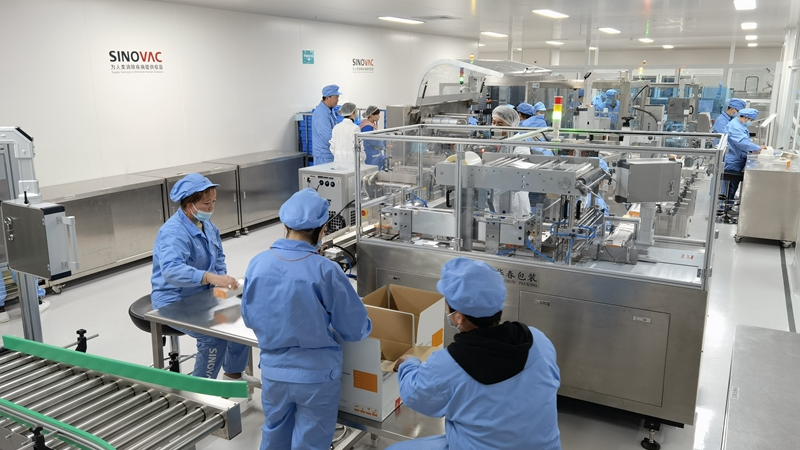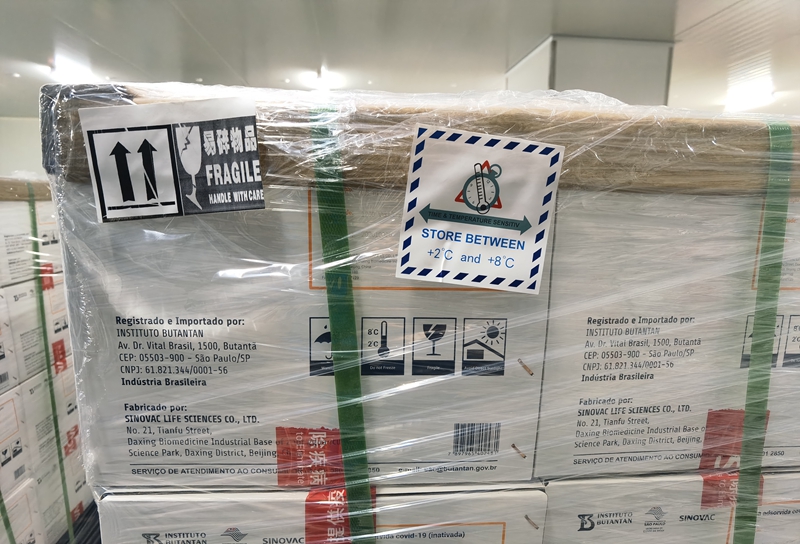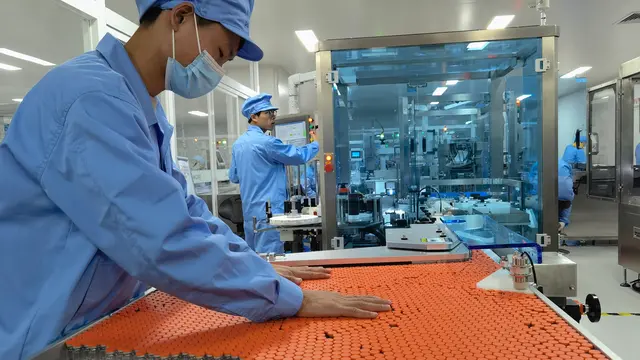
Workers at the production line of Sinovac COVID-19 vaccine facility /CGTN
A race for life in 2020.
China has been one of the world's leading developers of COVID-19 vaccines. On April 2, it approved the first COVID-19 vaccine candidate for clinical trials. Since July, five have been undergoing human trials in countries like the United Arab Emirates (UAE), Brazil and Pakistan.
At the same time, vaccine makers have been preparing for mass production. Sinovac, one of the makers of China's leading vaccine candidates, built a new plant in southern Beijing. In early August, I became the first reporter to enter its production facility when it was still being tested. Company head Yin Weidong was happy about results from the first two stages of trials.
"After performing injections on over 1,000 volunteers, some only showed minor fatigue or discomfort... no more than 5 percent. As for effectiveness, after two injections, almost all volunteers developed antibodies, around 97 to 98 percent," said Yin.
Sinopharm's candidate, also an inactivated type, entered phase-three trials in late June. The company has production facilities in Beijing and Wuhan.

Workers at the production line of Sinovac COVID-19 vaccine facility /CGTN
"The vaccine has not officially been approved and marketed as of yet. But as a commodity, in the case of an emergency, foreign governments can purchase vaccines from us. There's no obstacle to such purchases. We'll supply the vaccine to whoever buys it. This is in compliance with the law," said Liu Jingzhen, Chairman of China National Pharmaceutical Group.
In early September, the two vaccines developed by Sinopharm and Sinovac were on public display at the China International Fair for Trade in Services. Chinese President Xi Jinping announced that Chinese vaccines will be public goods in the future.
"We're aiming to supply our vaccines in China as well as the world. Some of the collaborations we're having with different countries, we're not only doing the trials, but also to secure the quantity to supply to them," said Helen Yang, senior director of Global Strategy for Sinovac.
For many people, that was the first time they had seen a real COVID-19 vaccine. China approved emergency use of three vaccines in June, two from Sinopharm and one from Sinovac. Key groups of people, like those with higher risk of infection, are being vaccinated across the country this winter and next spring.
"After stringent monitoring and observation, no serious adverse event has occurred. About 60,000 recipients went to high-risk areas abroad for work, so far serious infections have not been reported," Zheng Zhongwei, director of Medical Science and Technology Development Center of the National Health Commission said during a news conference in December.
Chinese vaccines are also being delivered to other countries. One evening in mid-December, I got exclusive access to see how Sinovac delivered two million doses to Brazil.

Chinese COVID-19 vaccines can be stored at between 2 and 8 degrees Celsius. /CGTN
The vaccines can be stored at between 2 and 8 degrees Celsius, similar to the rabies vaccines. The warehouse was actually warmer than outside as it was winter in Beijing. In terms of transportation and storage, the hope is that it won't place too much of a burden on distribution systems across the world.
On December 9, the UAE approved Sinopharm's vaccine for market use, saying tests in the country showed it was 86 percent effective. Around Christmas, Turkish officials said Sinovac's vaccine showed over 90 percent effectiveness in tests. Brazil's state-run Butantan Institute also announced that Sinovac's vaccine has achieved the levels of efficacy required by the World Health Organization, adding detailed numbers would come later.
The two companies are still awaiting market approval for general use in China, but they've already prepared to roll the vials out domestically.
In my most recent visit to its production facilities, Sinovac's workers have been taking three shifts to cover 24-hour production. With a new production line ready for use soon, Sinovac said it's able to produce 600 million doses a year, not only for China but also for the whole world.
 简体中文
简体中文

